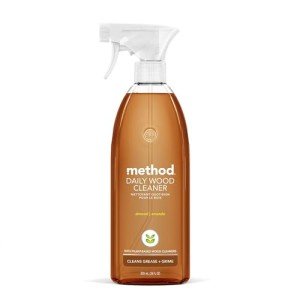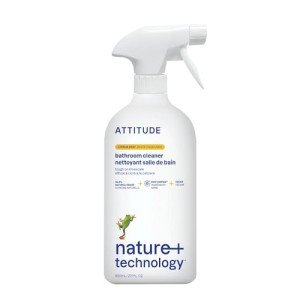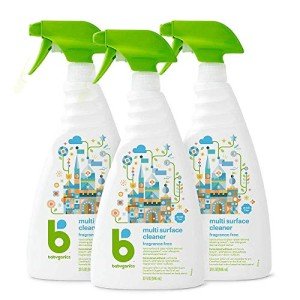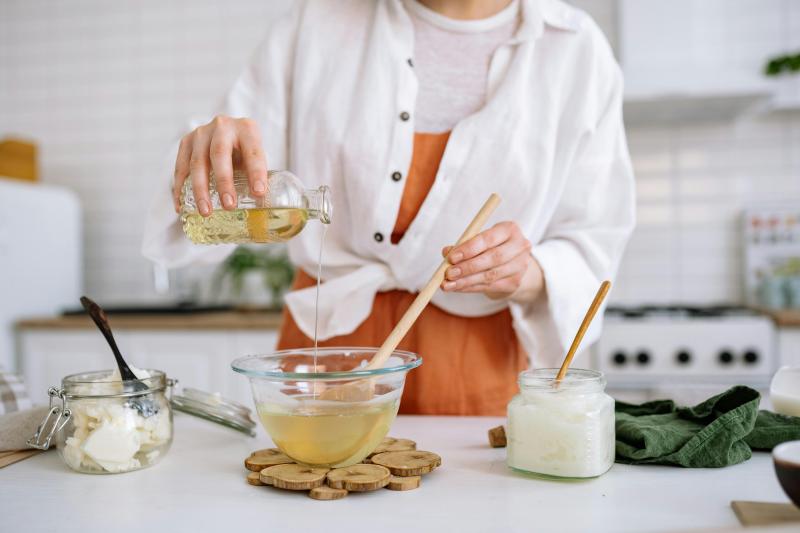|
BY JONATHAN ESSARY · June 23, 2025 |
|
READ EST: 5 MINS |
FINDING A NEW RHYTHM
The modern working parent faces a unique challenge: maintaining a clean, healthy home environment while juggling career demands and quality family time. The desire to create a non-toxic space for your children collides with the reality of limited hours and depleted energy reserves at the end of a workday[1]. This guide addresses this tension, offering practical solutions that respect both your time constraints and your commitment to a safer home environment[2].
Unlike idealized cleaning routines that demand hours of dedicated attention, this approach acknowledges the realities of working parenthood, where five uninterrupted minutes can feel like a luxury and where efficiency isn't just preferred, it's essential[3]. By implementing strategic systems rather than pursuing perfection, you can create a home that supports your family's health without sacrificing your sanity or precious family moments[4].
UNDERSTANDING THE WORKING PARENT'S CLEANING REALITY
THE TIME-SCARCITY CHALLENGE
Working parents operate within unique constraints that traditional cleaning advice often fails to address. Research shows that employed parents with children under 18 have approximately 4.5 fewer hours of free time per week than their childless counterparts—time often fragmented into small, unpredictable windows rather than convenient cleaning blocks[1][2]. This reality requires a fundamentally different approach to home maintenance.
The most effective cleaning strategies for working parents embrace what efficiency experts call "time chunking"—breaking tasks into small, manageable segments that can be completed in 5-15 minute intervals between other responsibilities[3]. This approach acknowledges that waiting for the "perfect time" to clean often means cleaning never happens at all[4].
THE NON-TOXIC IMPERATIVE
Working parents' motivation to maintain a non-toxic home environment often intensifies as awareness grows about the potential impact of conventional cleaning chemicals on developing children[5]. However, this commitment can create additional pressure when time is already scarce[6]. The key lies in finding solutions that don't force a choice between efficiency and safety.
Modern non-toxic cleaning products have evolved significantly, with many offering comparable convenience and effectiveness to their conventional counterparts[7]. The most parent-friendly options combine safety with time-saving features like concentrated formulas, multipurpose applications, and simplified systems that reduce decision fatigue[8].
BUILDING YOUR MINIMALIST CLEANING ARSENAL
THE POWER OF PRODUCT CONSOLIDATION
One of the most effective strategies for working parents is dramatically reducing the number of cleaning products in your home[1]. Research shows that the average American household contains 45 different cleaning products, yet professional cleaners typically use fewer than 10 to maintain even the largest homes[9]. This proliferation creates unnecessary complexity, storage challenges, and decision fatigue.
The most efficient approach centers on multipurpose concentrates that can be diluted for different applications[10]. Products like Branch Basics Concentrate or Force of Nature can replace dozens of single-purpose cleaners, simplifying both purchasing and daily use[11]. This consolidation reduces mental load, an overlooked but significant benefit for already-overwhelmed working parents[7].
ESSENTIAL NON-TOXIC PRODUCTS FOR BUSY PARENTS
|
Product Type |
Recommendation |
Key Benefits |
Best Applications |
|
Multipurpose Concentrate |
Branch Basics Concentrate |
One product for all surfaces, fragrance-free, safe for food contact |
Counters, bathrooms, glass, laundry, hands[10] |
|
Disinfectant |
Force of Nature |
EPA-registered disinfectant, made from salt, water & vinegar |
High-touch surfaces, illness recovery, food prep areas[11] |
|
Oxygen Booster |
Oxygen Boost or Sodium Percarbonate |
Enhances cleaning power, whitens, and removes stains |
Laundry, tough kitchen messes, grout[7] |
|
Microfiber Cloths |
High-quality microfiber set |
Reduces the need for cleaning products, washable, and versatile |
Dusting, glass, general cleaning[9] |
|
Steam Cleaner |
Handheld or mop style |
Chemical-free disinfection, multiple surface applications |
Floors, bathrooms, toys, high chairs[12] |
This minimalist approach saves time, reduces chemical exposure, and simplifies storage, a significant advantage for busy households where daily life constantly challenges organizational systems [8].
CREATING TIME-EFFICIENT CLEANING SYSTEMS
THE 15/15 METHOD FOR WORKING PARENTS
The most successful working parents implement what efficiency experts call the "15/15 Method"—15 minutes of focused cleaning in the morning and 15 minutes in the evening[3]. This approach acknowledges that marathon cleaning sessions rarely fit into working parents' schedules, while short, consistent efforts yield better results over time[1].
Morning cleaning focuses on quick reset tasks that improve the day's flow: making beds, wiping bathroom counters, and loading the dishwasher[3]. Evening sessions target the day's accumulation: a quick kitchen cleanup, preparing laundry for the next day, and a 5-minute pickup of the most-used living areas[13]. This system prevents the overwhelming buildup that often triggers cleaning avoidance[14].
ZONE CLEANING FOR FRAGMENTED SCHEDULES
Traditional cleaning schedules that assign specific tasks to specific days often fail working parents because they don't account for unpredictable work demands and family needs[2]. A more flexible approach divides your home into zones, allowing you to focus available time on one area without feeling overwhelmed by the whole house[15].
This system assigns each zone a priority level based on health impact and visibility[4]. High-priority zones (kitchen, main bathroom) receive attention first, while lower-priority areas (guest rooms, storage areas) can wait until more time becomes available[13]. This prioritization ensures that limited cleaning time addresses the most important spaces for family health and function[14].
PRACTICAL TIME-SAVING STRATEGIES
STRATEGIC PLACEMENT OF CLEANING SUPPLIES
One of the most effective time-saving approaches involves placing appropriate cleaning supplies in each room where they'll be used[16]. This eliminates the friction of gathering supplies, often the biggest barrier to quick cleaning sessions[17]. A simple caddy with room-specific essentials allows you to capitalize on small windows of opportunity throughout the day[2].
For working parents, this might mean keeping bathroom wipes under each sink, a small vacuum on each floor, and multipurpose spray in both kitchen and bathrooms[16]. While this approach may seem counterintuitive to minimalism, it reduces total cleaning time by up to 40% according to efficiency studies[4].
THE POWER OF PREVENTIVE HABITS
Working parents benefit tremendously from implementing small preventive habits that reduce cleaning needs[18]. These micro-habits require minimal time but yield significant results when practiced consistently[13]. Examples include:
· Keeping shoes at the door to reduce floor cleaning by up to 60%[18]
· Wiping shower walls while still in the shower to prevent soap scum buildup[2]
· Using shower curtain liners that can be machine-washed rather than replaced[16]
· Implementing a "one in, one out" policy for toys and household items[4]
· Teaching children the "clean as you go" approach from an early age [18]
These preventive strategies are particularly valuable for working parents because they reduce the need for time-intensive deep cleaning sessions that rarely fit into busy schedules[14].
FAMILY INVOLVEMENT: AGE-APPROPRIATE SYSTEMS
CREATING SUSTAINABLE FAMILY PARTICIPATION
Perhaps the most critical system for working parents involves appropriate family participation in home maintenance [18]. Research consistently shows that children who participate in household tasks develop greater responsibility, executive function skills, and empathy while simultaneously reducing parents' workload[2].
The key lies in creating age-appropriate expectations with clear systems rather than vague requests[4]. Even young children can participate through simple, consistent routines like the "toy reset" before dinner or the "evening five," where each family member puts away five items before bedtime[16].
TECHNOLOGY-ENHANCED CLEANING SYSTEMS
Modern working parents can leverage technology to create more efficient cleaning systems[12]. Smart home devices can automate certain cleaning tasks, while family management apps can coordinate responsibilities without requiring constant parental oversight[18].
Robotic vacuums programmed to run during work hours, app-based family chore systems with built-in rewards, and shared digital shopping lists for cleaning supplies all reduce the mental load that typically falls on parents[12]. These technological solutions are particularly valuable for dual-career households where coordination between parents is essential but time for communication is limited[13].
EMBRACING REALISTIC STANDARDS
The most important mindset shift for working parents involves embracing realistic standards for home cleanliness[14]. Research shows that the perception of what constitutes a "clean home" has changed dramatically over generations, with modern expectations often reflecting unrealistic standards perpetuated by media and social comparison[2].
For working parents committed to non-toxic living, success comes from focusing on health impact rather than perfection[9]. A home that supports family wellbeing through reduced chemical exposure and basic cleanliness provides greater benefits than a spotless showcase maintained through stress and family tension[4].
By implementing efficient systems, consolidating products, and involving the whole family, you can create a home that honors your professional commitments and your desire to provide a healthy environment for your children[2]. The ultimate goal isn't perfection but balance—a clean enough, safe enough home that supports your family's health while preserving the time and energy needed for what matters most[14].
REFERENCES & SOURCES:
- https://tidyupped.com/cleaning-schedule-for-working-moms-and-dad/
- https://www.mumandcareer.co.uk/cleaning-schedule-hacks-for-working-parents/
- https://adamcleaning.uk/quick-cleaning-routines-for-busy-parents/
- https://hellamaid.ca/cleaning-guide/cleaning-strategies-for-busy-work-from-home-parent/
- https://www.youtube.com/watch?v=Jg6U7uqd13Y
- https://honestmum.com/10-proven-family-friendly-cleaning-tips-for-a-healthy-home/
- https://www.thegoodtrade.com/features/natural-nontoxic-cleaning-products/
- https://www.vitacost.com/blog/non-toxic-cleaning-products/
- https://www.homesandgardens.com/solved/ultimate-shopping-guide-non-toxic-cleaning-supplies
- https://branchbasics.com
- https://www.forceofnatureclean.com
- https://www.rd.com/list/fast-house-cleaning-products/
- https://moderatelymessyrd.com/cleaning-schedule-for-working-moms/
- https://pennypinchinmom.com/simplified-cleaning-schedule-for-working-moms/
- https://www.blueland.com/articles/simplify-your-house-cleaning-schedule-for-working-parents
- https://www.finehomesandliving.com/featured/9-useful-and-time-saving-cleaning-hacks-for-busy-parents/article_511143e2-881b-11eb-b9d7-3be1aa72dfc9.html
- https://paragoncleaningllc.com/7-time-saving-cleaning-hacks-for-busy-working-moms/
- https://www.diamondcertified.org/home-cleaning-tips-for-busy-families/







